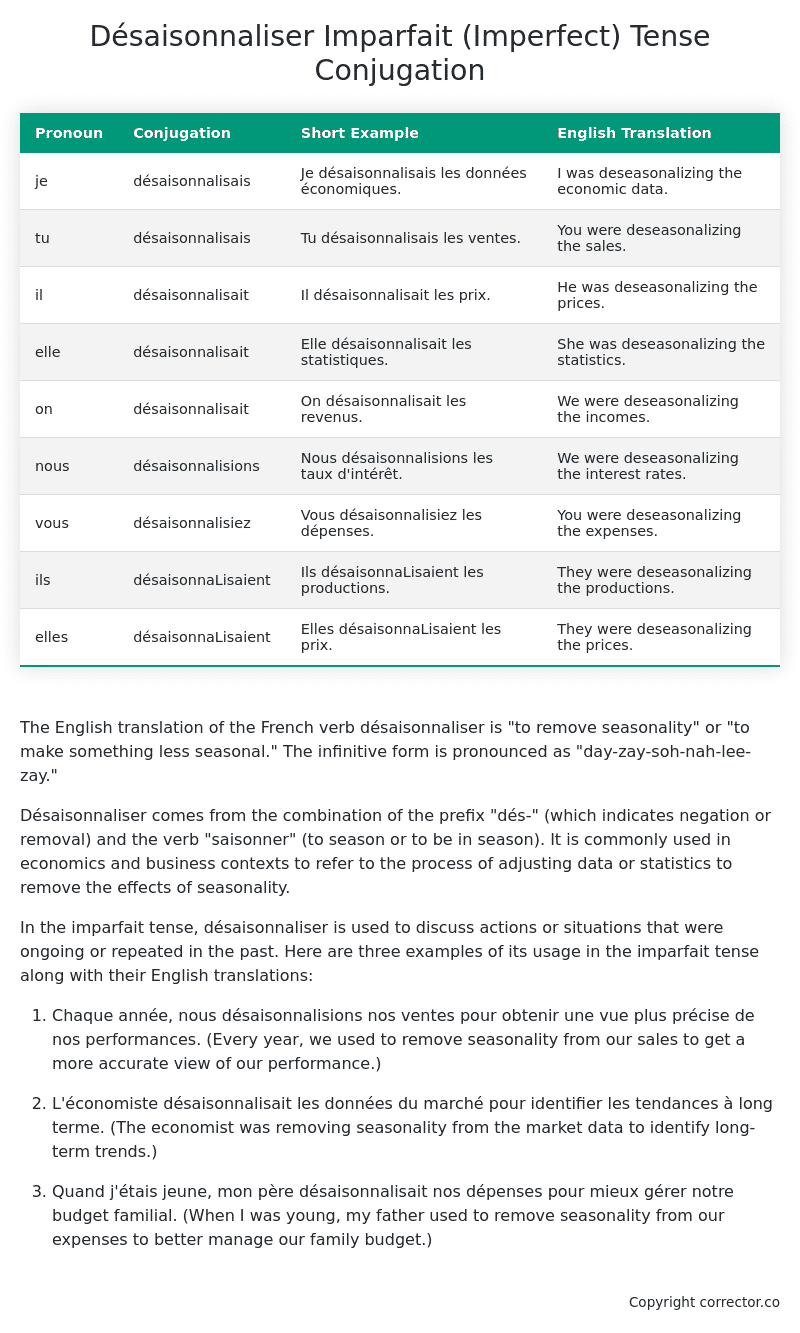Imparfait (Imperfect) Tense Conjugation of the French Verb désaisonnaliser
Introduction to the verb désaisonnaliser
The English translation of the French verb désaisonnaliser is “to remove seasonality” or “to make something less seasonal.” The infinitive form is pronounced as “day-zay-soh-nah-lee-zay.”
Désaisonnaliser comes from the combination of the prefix “dés-” (which indicates negation or removal) and the verb “saisonner” (to season or to be in season). It is commonly used in economics and business contexts to refer to the process of adjusting data or statistics to remove the effects of seasonality.
In the imparfait tense, désaisonnaliser is used to discuss actions or situations that were ongoing or repeated in the past. Here are three examples of its usage in the imparfait tense along with their English translations:
-
Chaque année, nous désaisonnalisions nos ventes pour obtenir une vue plus précise de nos performances. (Every year, we used to remove seasonality from our sales to get a more accurate view of our performance.)
-
L’économiste désaisonnalisait les données du marché pour identifier les tendances à long terme. (The economist was removing seasonality from the market data to identify long-term trends.)
-
Quand j’étais jeune, mon père désaisonnalisait nos dépenses pour mieux gérer notre budget familial. (When I was young, my father used to remove seasonality from our expenses to better manage our family budget.)
Table of the Imparfait (Imperfect) Tense Conjugation of désaisonnaliser
| Pronoun | Conjugation | Short Example | English Translation |
|---|---|---|---|
| je | désaisonnalisais | Je désaisonnalisais les données économiques. | I was deseasonalizing the economic data. |
| tu | désaisonnalisais | Tu désaisonnalisais les ventes. | You were deseasonalizing the sales. |
| il | désaisonnalisait | Il désaisonnalisait les prix. | He was deseasonalizing the prices. |
| elle | désaisonnalisait | Elle désaisonnalisait les statistiques. | She was deseasonalizing the statistics. |
| on | désaisonnalisait | On désaisonnalisait les revenus. | We were deseasonalizing the incomes. |
| nous | désaisonnalisions | Nous désaisonnalisions les taux d’intérêt. | We were deseasonalizing the interest rates. |
| vous | désaisonnalisiez | Vous désaisonnalisiez les dépenses. | You were deseasonalizing the expenses. |
| ils | désaisonnaLisaient | Ils désaisonnaLisaient les productions. | They were deseasonalizing the productions. |
| elles | désaisonnaLisaient | Elles désaisonnaLisaient les prix. | They were deseasonalizing the prices. |
Other Conjugations for Désaisonnaliser.
Le Present (Present Tense) Conjugation of the French Verb désaisonnaliser
Imparfait (Imperfect) Tense Conjugation of the French Verb désaisonnaliser (You’re reading it right now!)
Passé Simple (Simple Past) Tense Conjugation of the French Verb désaisonnaliser
Passé Composé (Present Perfect) Tense Conjugation of the French Verb désaisonnaliser
Futur Simple (Simple Future) Tense Conjugation of the French Verb désaisonnaliser
Futur Proche (Near Future) Tense Conjugation of the French Verb désaisonnaliser
Plus-que-parfait (Pluperfect) Tense Conjugation of the French Verb désaisonnaliser
Passé Antérieur (Past Anterior) Tense Conjugation of the French Verb désaisonnaliser
Futur Antérieur (Future Anterior) Tense Conjugation of the French Verb désaisonnaliser
Subjonctif Présent (Subjunctive Present) Tense Conjugation of the French Verb désaisonnaliser
Subjonctif Passé (Subjunctive Past) Tense Conjugation of the French Verb désaisonnaliser
Subjonctif Imparfait (Subjunctive Imperfect) Tense Conjugation of the French Verb désaisonnaliser
Conditionnel Présent (Conditional Present) Tense Conjugation of the French Verb désaisonnaliser
Conditionnel Passé (Conditional Past) Tense Conjugation of the French Verb désaisonnaliser
Conditionnel Passé II (Conditional Past II) Tense Conjugation of the French Verb désaisonnaliser
L’impératif Présent (Imperative Present) Tense Conjugation of the French Verb désaisonnaliser
L’impératif Passé (Imperative Past) Tense Conjugation of the French Verb désaisonnaliser
L’infinitif Présent (Infinitive Present) Tense Conjugation of the French Verb désaisonnaliser
L’infinitif Passé (Infinitive Past) Tense Conjugation of the French Verb désaisonnaliser
Le Participe Présent (Present Participle) Tense Conjugation of the French Verb désaisonnaliser
Le Participe Passé (Past Participle) Tense Conjugation of the French Verb désaisonnaliser
Struggling with French verbs or the language in general? Why not use our free French Grammar Checker – no registration required!
Get a FREE Download Study Sheet of this Conjugation 🔥
Simply right click the image below, click “save image” and get your free reference for the désaisonnaliser imparfait tense conjugation!

Désaisonnaliser – About the French Imparfait Tense
NOTE: To take a deep dive into all the French tenses then see our article on Mastering French Tense Conjugation.
Formation of the Imparfait Tense
For regular -er verbs:
For regular -ir verbs
For regular -re verbs
Common Everyday Usage Patterns
Description of Past Habits
Background Information
Mental and Emotional States
It’s employed to express emotions, thoughts, or physical sensations in the past. For example: “J’étais content quand il est arrivé.” (I was happy when he arrived.)
Ongoing Actions
Points to Note About the Imparfait Tense
Passé Composé vs. Imparfait
Conditional
Si Clauses
Narration
I hope you enjoyed this article on the verb désaisonnaliser. Still in a learning mood? Check out another TOTALLY random French verb imparfait conjugation!


